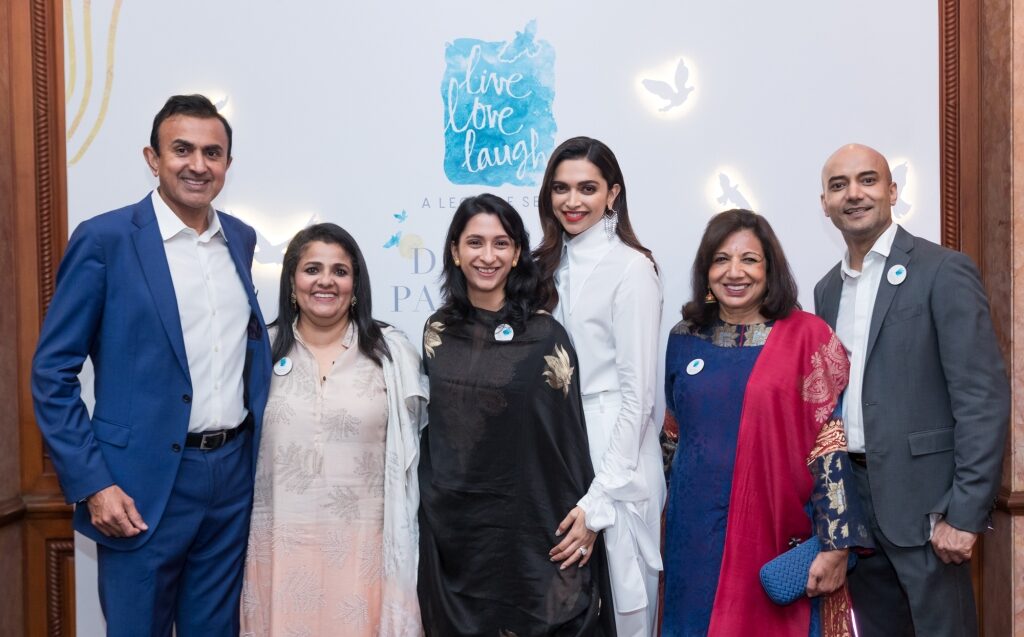The three verbs in the name of this organisation founded by Indian film actor Deepika Padukone appear to have been chosen with thought, care and deliberation, to send out a message to all concerned that any conversation around mental health is pointless without these (live-love-laugh) as the goals. To be sure, that’s easier said than done but then, nobody expected it to be anything but an uphill task – that is, getting a tight-lipped society to accord mental health even a sideways nod.
At the same time, there is no denying that the conversation around mental health has had a definitive shift in the last few years, thanks in a considerable measure to the openness with which celebrities/influencers/public personalities/role models around the world have talked about it, acknowledged it, and owned it – and how mainstream media covered it as a consequence. In India, if there is one individual who can be said to have played a pioneer’s and a catalyst’s role in bringing about this paradigm/societal shift, it has to be Deepika herself. She has become the poster child for this very crucial movement, and this has happened not a moment sooner.
What these famous people have done is to, firstly, make mental health a relatable subject, an everyday subject if you may”in the sense that it can happen with anybody; and secondly, that it is an illness like any other, something that Deepika has been reiterating endlessly and, as we can see, to good effect.
The point that it can happen with anybody has done the most to assure us that, yes, it can happen with any of us. That these and these are the symptoms – and sometimes there may be none actually. Either way, there is a need to recognise it.
That it’s an illness like any other also means that there is a treatment and professional guidance involved. What it is not is a fleeting moment or a collection of fleeting moments; nor is it a random phase; and certainly it’s not a luxury of the rich and/or the famous.
Mental health troubles, whether in the form of depression or detachment or disassociation or disinterest, don’t happen as per socio-economic categories. They can come down on anyone in any age group or gender, though there may be studies pointing to certain sections of people as more vulnerable.
 ‘Mental illness is perhaps the most urgent issue of our times’ – Anisha Padukone, CEO, The Live Love Laugh Foundation (TLLLF)
‘Mental illness is perhaps the most urgent issue of our times’ – Anisha Padukone, CEO, The Live Love Laugh Foundation (TLLLF)
This statement is not just for effect. Though the effect is good too, if it can shake us out of our stupor, considering that mental health is very much a grey area still, the conversations and sharing of stories notwithstanding. The numbers of those who are afflicted with mental health issues are more than one may care to guess – refer to any number of studies by various credible organisations, and you will come across some grim statistics. What makes it a complex issue are the various levels of understanding and not-understanding prevalent across cultures and countries. So, when we talk about bringing about interventions that will address the issue effectively, we are talking about specific, customised and contextualised interventions.
Something that TLLLF’s CEO Anisha Padukone underlines in her exclusive interaction with CauseBecause. Rationalising why we are looking at a long journey ahead in the context of mainstreaming mental health in our collective consciousness, she says: ‘Mental health is a large area that will require sustained efforts and significant interventions to make an impact. Stigma and lack of awareness are prevalent across the board and something that we will need to address. While mental illness and its prevalence does not discriminate and can affect any individual, I believe that the interventions and solutions need to be culturally and contextually tailored based on the setting.’
At the same time, we are so far behind in the ‘fight’ against the issues surrounding the subject that interventions on several fronts need to be put into action simultaneously. It can be fairly reasonably expected that when the stigma and the ignorance become less, the focus can be more and more on dealing with the condition per se and assisting patients (and caretakers) with the healing process.
Experiencing a mental health problem is hard enough and poses its own challenges, without having to deal with the stigma, judgement and isolation that often come with it. These factors can have a negative effect on various aspects of an afflicted person’s life, be it relationships, work, or inclusion in society. People with mental illness have oftentimes been thought to be unstable and sometimes even capable of causing harm, to themselves or others. Such rejection and the resultant isolation can end up trapping patients in a cycle of illness. The stigma and discrimination prevent people from seeking help, thereby delaying treatment and recovery. That explains why so much of the current effort and advocacy around addressing mental health-related issues is focused on peeling off these superficial layers. Fact is that with proper treatment, people suffering from mental disorders can live productive lives and be a vital part of their communities – and this fact should be underlined in the clearest way.
Covering the first mile: Stigma, indifference, lack of awareness
The stigma that hangs over mental illness is so strongly rooted that until a few years ago it may have seemed like an insurmountable problem. Like it or not, the unwritten codes by which the attitudes of society manifest themselves are the hardest to deal with, because they work in ways that are beyond grasp, time, and maybe even reasoning. And when a shroud of secrecy comes into the picture, it becomes all the more challenging.
Generating and boosting awareness and ‘destigmatization’ are in fact the key areas of focus for TLLLF, says Anisha. By doing that, TLLLF is aiming to address a significant gap in India’s mental health environment.
 It’s only by throwing open the subject to conversation that real understanding will dawn, and TLLLF has ran some high-profile and high-impact campaigns to achieve just that. Among these are DobaraPoocho, India’s first nationwide public awareness campaign on mental health, and #NotAshamed, an anti-stigma campaign championing stories of survivors of mental illness.
It’s only by throwing open the subject to conversation that real understanding will dawn, and TLLLF has ran some high-profile and high-impact campaigns to achieve just that. Among these are DobaraPoocho, India’s first nationwide public awareness campaign on mental health, and #NotAshamed, an anti-stigma campaign championing stories of survivors of mental illness.
Apart from these campaigns, TLLLF has:
- commissioned a survey report on public perception of mental health in India;
- published a directory of resources for those who need help;
- conducted a nationwide adolescent mental health programme;
- funded treatment for patients in rural communities;
- launched a course on Common Mental Disorders for primary care physicians; and
- curated an annual lecture series that had the world’s leading thinkers and achievers contributing insights that could influence the narrative on mental health.
Outreach and impact
TLLLF runs core programmes in three areas: 1) adolescent mental health in schools; 2) rural mental health; and 3) augmenting capacity with training for primary-care physicians.
The impact of these on the ground has to be seen beyond the numbers, though numbers are important too. When it comes to a subject like mental health, it goes without saying that dispelling the misconceptions attached to it and persuading those afflicted as well as their families to seek treatment are even more crucial – the numbers will follow in due course of time.
Let’s take a look at TLLLF’s report card so far:
You Are Not Alone, the Foundation’s flagship health awareness programme for school students and teachers, has covered approximately 197,019 students and 20,100 teachers in 900+ schools across 10 Indian states and 12 cities.
The rural mental health programme has been funding the treatment of more than 2,000 patients annually in the states of Karnataka and Odisha.
With regard to augmenting capacity, TLLLF recently launched a Certificate Course in Common Mental Disorders (CCCMD) in collaboration with Public Health Foundation of India (PHFI) and Association of Healthcare Providers (India) (AHPI). The course aims at enhancing knowledge, skills and competencies of primary-care physicians to enable them to identify and manage common mental disorders. In its first cycle, 143 primary-care physicians from 17 states have registered for the five modules of the online course. The course is being conducted from four centres: Delhi, Mumbai, Bengaluru and Kolkata. PHFI is the implementing partner; TLLLF is the knowledge and grant partner; and AHPI is the strategic partner.
The award-winning Dobara Poocho (Ask Again) campaign undertaken by the Foundation in 2016 received over 560 million total impressions across TV, print and digital mediums.
Their #NotAshamed campaign in 2018 featured original narratives encouraging other survivors to share their story with the world and garnered more than 100 million impressions across platforms.
In September 2019, TLLLF launched an annual series called Live, Love, Laugh – a lecture series with Deepika Padukone. The aim of the annual lecture series is to invite the world’s foremost thinkers and achievers to present their ideas that can help shape the global mental health narrative. The maiden lecture was delivered by Pulitzer Prize-winning author and Padma Shri awardee Dr Siddhartha Mukherjee.

Pulitzer Prize winner Dr Siddhartha Mukherjee at the first edition of Live Love Laugh – a lecture series with Deepika Padukone
Then, as is well known, Deepika has extensively leveraged her influence as a global icon (as exemplified by her inclusion in Time Magazine’s List of Top 100 Influencers in 2019) to drive the mental health agenda at platforms as diverse as the WEF and via her own social media platforms, which have a following of more than 100 million.
TLLLF was the 2019 recipient of the prestigious Dr Guislain ‘Breaking the Chains of Stigma’ Award. The global award, which is an initiative of the Dr Guislain Museum in Ghent, Belgium, and Janssen Research and Development, LLC, honoured TLLLF’s efforts to change the dialogue around mental illness.
Deepika was felicitated with the 26th Annual Crystal Award at the World Economic Forum 2020 in Davos for her leadership in raising mental health awareness.

How have you been during the pandemic?
In a sense, the Covid-19 outbreak can be said to have brought the subject of mental health out in the open. The scale of the pandemic and its fallout in terms of the prolonged lockdown, isolation, social distancing, anxiety over a range of issues, and a host of attendant issues has left all of us feeling vulnerable.
As Anisha explains, ‘Crises and traumatic events such as the pandemic often give rise to or aggravate mental illness. The unprecedented Covid-19 pandemic has created several disruptions in people’s lives – from their work schedules going haywire to having to redefine spaces within the house, dealing with uncertainty about the future, finances and their health, and so on. Most people are feeling a great sense of stress or anxiety. The pandemic-induced lockdown was a scenario that none of us were prepared for.’
In different degrees, more of us now have a sense of what it feels like to be in the corner. And maybe that has made us more accepting of the reality that is mental health.
‘Extraordinary times often require unusual responses,’ Anisha reflects, and because this unprecedented situation is expected to compound an already troubling scenario, she assures us that ‘at TLLLF we are accounting for this reality and have adapted accordingly.’
Using technology, digital media and other media, the organisation has actively raised awareness through this period about stress, anxiety and depression, in line with their overall mission, and encouraged people to reach out/offer support to those around them. TLLLF’s in-house subject-matter experts Dr Shyam Bhat and Anna Chandy have shared their insights on the organisation’s digital channels and in other media during this time.
Deepika Padukone had recently engaged in an in-depth conversation on suicide and why people do what they do, with TLLLF trustee Dr Shyam Bhat and Dr Soumitra Pathare, consultant psychiatrist and director at Centre for Mental Health Law and Policy, ILS.
Informing that a curated list of helplines is listed on the TLLLF website, Anisha emphasises that ‘if one is feeling anxious or overwhelmed, we should not hesitate to seek help from a qualified mental health professional.’
As part of their attempt to adapt to the current environment, TLLLF is exploring means of virtual (online) delivery for their school programme while trying to maintain the quality of on-ground delivery. Direct beneficiaries continue to be supported via TLLLF’s rural programme, with their psychiatric treatment being overseen via telemedicine and telepsychiatry.

Anisha and Deepika Padukone with TLLLF trustees Dr Murali Dorwaiswamy, Anna Chandy, Kiran Mazumdar Shaw and Dr Shyam Bhat
The big picture over the long haul
On the challenges that will likely come up with regard to investments in the domain and how best to tackle these, Anisha says: ‘This is the time to remind ourselves that investments in mental health have a direct impact on the progress of humanity. Under-investment and diffused focus on mental health has a way of being exposed especially in times of crises. If we are to focus on the way forward, now is not the time for the world to step off the accelerator on mental health. In fact, it is time to exponentially increase our investments and focus energies to help countries, communities and individuals cope with the toll that the crisis has had, and will continue to have, on our mental health.’
‘From a corporate organisation’s standpoint,’ she continues, ‘investments in employees’ mental health bear a direct result to productivity and the bottom line/profits of a company. Morale, attitude and staff wellbeing will determine how well a company does. But it’s going to take strong commitment and leadership from the top; the leadership has to be empathetic and make investments in mental health.’
As a matter of fact, as CauseBecause had underlined in this 2019 piece, corporates can easily step in and make mental health awareness a focal part of their CSR, not just in terms of funding but also implementation. After all, there are plenty of causes, including healthcare, for which they routinely run awareness programmes. Starting with the low-hanging fruits that are their own employees and the communities around their operational areas, they can partner with several organisations working in this domain to educate people on this extremely critical health issue.
There is no saying how long the current crisis will last, how it will pan out, what lasting changes it will leave on various areas of our lives, and how those changes will affect the dynamics of social interactions”basically how we live and cohabit, whether with other creatures including human beings, as well as with Earth’s biodiversity. In an ideal world, the social distancing will also engender social empathy. The hope is that in all of this churn, mental health will be all the better for the spotlight that has fallen on it – and the way that has shaped the public discourse around it.
‘We must try to accept and adapt to the situation as best as we can, while also realising that these are difficult times for everyone. The world over there’s been a renewed focus on mental health. In India, people are now more open about talking about the effects of what is happening, about mental health issues, the stress that people are facing, etc. It is important for all of us to educate ourselves and be sensitive to the needs of those with mental illness. Society must realise mental illness is the most urgent issue of our times; and that depression and suicide will be the single largest cause of comorbidity and mortality in the next ten years. Everyone in society has to collectively engage – policymakers, non-governmental organisations, corporates, and the general public at large,’ says Anisha.
She should know, being at the forefront of a movement that is ever so gently guiding those who are coming out of the shadows.
- Every sixth Indian needs mental health help.
- 1 in 20 people in India suffers from depression.
- Nearly 15% of Indian adults need active intervention for one or more mental health issues.
- Children and adolescents are also vulnerable to mental disorders. Nearly 9.8 million young Indians aged between 13 and 17 years are in need of active interventions.
- Three out of four persons with a severe mental disorder experience significant disability in work, social and family life.
- There is a paucity of mental health professionals (psychiatrists, psychologists and psychiatric social workers) in India. This necessitates the engagement of non- specialist professionals for mental health care.

